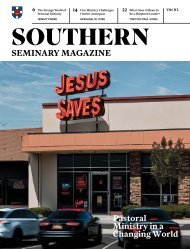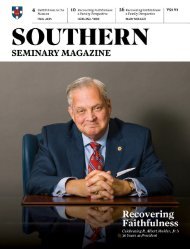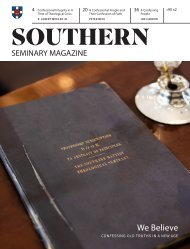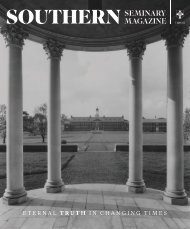Southern Seminary Magazine (Vol 90.1) The Light of Truth: Apologetics in the 21st Century
Create successful ePaper yourself
Turn your PDF publications into a flip-book with our unique Google optimized e-Paper software.
timothy paul jones<br />
<strong>the</strong> risen Christ.<br />
<strong>The</strong> philosopher Aristotle used <strong>the</strong> words apologia<br />
and kategoria to describe <strong>the</strong> two types <strong>of</strong> speeches<br />
presented <strong>in</strong> a court <strong>of</strong> law. Kategoria was a speech <strong>of</strong><br />
accusation related to events that had happened <strong>in</strong> <strong>the</strong><br />
past; <strong>the</strong> apologia was a speech <strong>of</strong> defense <strong>in</strong> response<br />
to <strong>the</strong> kategoria. <strong>The</strong> apostle Peter used this term for a<br />
defense when he wrote <strong>the</strong>se words to Christians <strong>in</strong><br />
Asia M<strong>in</strong>or: “In your hearts regard Christ <strong>the</strong> Lord as<br />
holy, ready at any time to give a defense to anyone who<br />
asks you for a reason for <strong>the</strong> hope that is <strong>in</strong> you” (1 Pet,<br />
3:15, emphasis added).<br />
Here’s how I def<strong>in</strong>e “apologetics,” on <strong>the</strong> basis <strong>of</strong> this<br />
text and o<strong>the</strong>rs scattered throughout <strong>the</strong> Scriptures:<br />
apologetics is <strong>the</strong> reverent, reasonable, and humble defense—through<br />
our words and through our lives—<strong>of</strong> <strong>the</strong><br />
hope we have <strong>in</strong> <strong>the</strong> risen Christ, as this hope has been<br />
revealed <strong>in</strong> his Word and <strong>in</strong> his world. <strong>Apologetics</strong> isn’t<br />
say<strong>in</strong>g, “I’m sorry”; it’s a defense that reveals <strong>the</strong> <strong>in</strong>coherence<br />
<strong>of</strong> <strong>the</strong> unbeliever’s worldview by po<strong>in</strong>t<strong>in</strong>g to <strong>the</strong> <strong>in</strong>ternal<br />
coherence and external evidence for <strong>the</strong> believer’s<br />
hope <strong>in</strong> <strong>the</strong> risen Christ and <strong>in</strong> his written Word.<br />
2<br />
Hol<strong>in</strong>ess provides <strong>the</strong> foundation for <strong>the</strong> proclamation<br />
<strong>of</strong> our hope.<br />
<strong>The</strong> words <strong>of</strong> Simon Peter <strong>in</strong> 1 Peter 3:15 can become a<br />
bumper sticker for apologetics, but this text is far richer,<br />
deeper, and more beautiful than we sometimes recognize.<br />
This text seems to have been written to Christians who are<br />
beg<strong>in</strong>n<strong>in</strong>g to experience social exclusion and perhaps even<br />
civic consequences for <strong>the</strong>ir faithfulness to Jesus. In this<br />
context, <strong>the</strong> first defense <strong>of</strong> <strong>the</strong> faith to which Peter calls<br />
<strong>the</strong>m is hol<strong>in</strong>ess (1 Pet. 1:15–17; 2:9–17; 3:13–17).<br />
Our defense <strong>of</strong> <strong>the</strong> Christian faith doesn’t end with our<br />
hol<strong>in</strong>ess, but it must start with hol<strong>in</strong>ess. Hol<strong>in</strong>ess won’t<br />
ultimately protect <strong>the</strong> people from persecution, but it ensures<br />
that whatever <strong>the</strong>y suffer will be for <strong>the</strong> sake <strong>of</strong> <strong>the</strong>ir<br />
Savior and not because <strong>of</strong> <strong>the</strong>ir s<strong>in</strong>.<br />
3<br />
A Christian’s hope is centered <strong>in</strong> <strong>the</strong> resurrection—and<br />
so is our defense.<br />
Throughout 1 Peter, Simon Peter centers <strong>the</strong> Christian’s<br />
hope <strong>in</strong> <strong>the</strong> resurrection (1 Pet. 1:3, 13, 21).<br />
Sometimes, his focus is on <strong>the</strong> resurrection <strong>of</strong> Jesus on<br />
<strong>the</strong> third day; o<strong>the</strong>r times, it’s centered on our future resurrection,<br />
which <strong>the</strong> resurrection <strong>of</strong> Jesus guaranteed. But,<br />
ei<strong>the</strong>r way, resurrection is <strong>the</strong> foundation <strong>of</strong> our hope.<br />
So, what does this mean for apologetics?<br />
If apologetics is giv<strong>in</strong>g a reason for our hope, and hope<br />
is centered <strong>in</strong> <strong>the</strong> resurrection, <strong>the</strong> resurrection should be<br />
central <strong>in</strong> Christian apologetics. When <strong>the</strong> resurrection is<br />
not central <strong>in</strong> apologetics, <strong>the</strong> practice <strong>of</strong> apologetics can<br />
turn <strong>in</strong>to a bad game <strong>of</strong> <strong>the</strong>ological trivia, with <strong>the</strong> unbeliever<br />
rais<strong>in</strong>g a random series <strong>of</strong> objections until he or she<br />
“w<strong>in</strong>s” by com<strong>in</strong>g up with a question that <strong>the</strong> Christian can’t<br />
answer. When <strong>the</strong> resurrection <strong>of</strong> Jesus is central, however,<br />
apologetics can never stray far from <strong>the</strong> gospel, and we respond<br />
to <strong>the</strong> unbeliever’s questions by turn<strong>in</strong>g <strong>the</strong> question<br />
toward <strong>the</strong> cross and <strong>the</strong> empty tomb.<br />
If you choose to focus your apologetics on conv<strong>in</strong>c<strong>in</strong>g<br />
an unbeliever that a particular approach to creation<br />
is correct—even if you conv<strong>in</strong>ce <strong>the</strong> unbeliever that<br />
you’re correct—that <strong>in</strong>dividual has still not been confronted<br />
with <strong>the</strong> gospel. If you conv<strong>in</strong>ce someone that<br />
<strong>the</strong>re are sound philosophical reasons why a good God<br />
might allow evil <strong>in</strong> <strong>the</strong> world, and <strong>the</strong>y agree with you<br />
but never hear <strong>the</strong> hope <strong>of</strong> <strong>the</strong> resurrection, your defense<br />
is a miserable failure. Why? In your passion to defend<br />
<strong>the</strong> truth, you have wandered from a focus on <strong>the</strong> gospel—<strong>the</strong><br />
life, death, and resurrection <strong>of</strong> Jesus by which<br />
God is reconcil<strong>in</strong>g s<strong>in</strong>ners to himself and reveal<strong>in</strong>g his<br />
reign <strong>in</strong> <strong>the</strong> world.<br />
Any apologetic that def<strong>in</strong>es <strong>the</strong> truth and defends <strong>the</strong><br />
truth but never delivers a call to believe <strong>the</strong> gospel is<br />
empty and va<strong>in</strong>. <strong>Apologetics</strong> is a means that God chooses<br />
to use for his glory; <strong>the</strong> power, however, is not <strong>in</strong> our<br />
apologetics but <strong>in</strong> <strong>the</strong> gospel <strong>of</strong> Jesus Christ. <strong>The</strong> gospel<br />
alone is “<strong>the</strong> power <strong>of</strong> God for salvation” (Rom 1:16).<br />
That’s what Charles H. Spurgeon was gett<strong>in</strong>g at when<br />
he said, “Suppose a number <strong>of</strong> persons were to take it<br />
<strong>in</strong>to <strong>the</strong>ir heads that <strong>the</strong>y had to defend a lion.… Open<br />
<strong>the</strong> door, and let <strong>the</strong> lion out!… He would take care <strong>of</strong><br />
himself.… <strong>The</strong> best ‘apology’ for <strong>the</strong> gospel is to let <strong>the</strong><br />
gospel out.… Preach Jesus Christ and him crucified.<br />
Let <strong>the</strong> Lion out!”<br />
Timothy Paul Jones is Vice President for Doctoral Studies<br />
and C. Edw<strong>in</strong> Gheens Pr<strong>of</strong>essor <strong>of</strong> Christian Family M<strong>in</strong>istry.<br />
44 <strong>the</strong> sou<strong>the</strong>rn baptist <strong>the</strong>ological sem<strong>in</strong>ary






